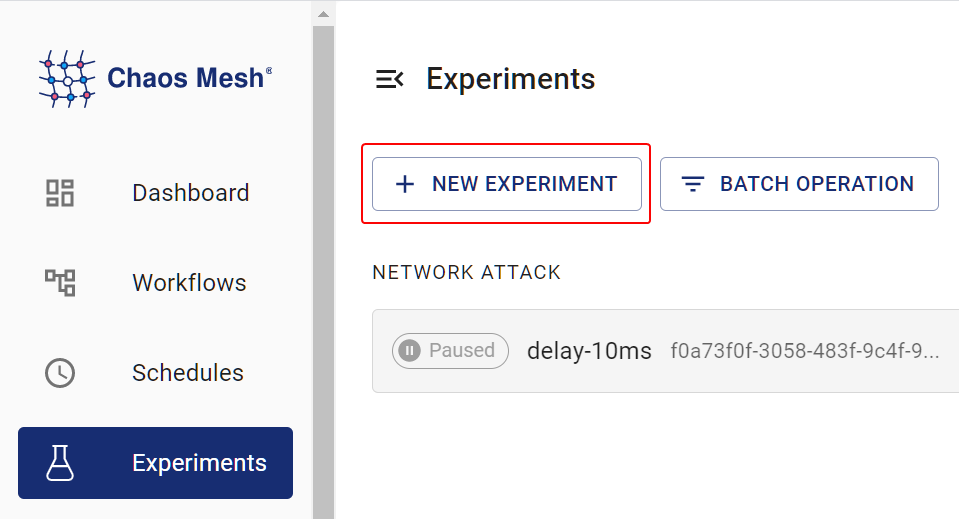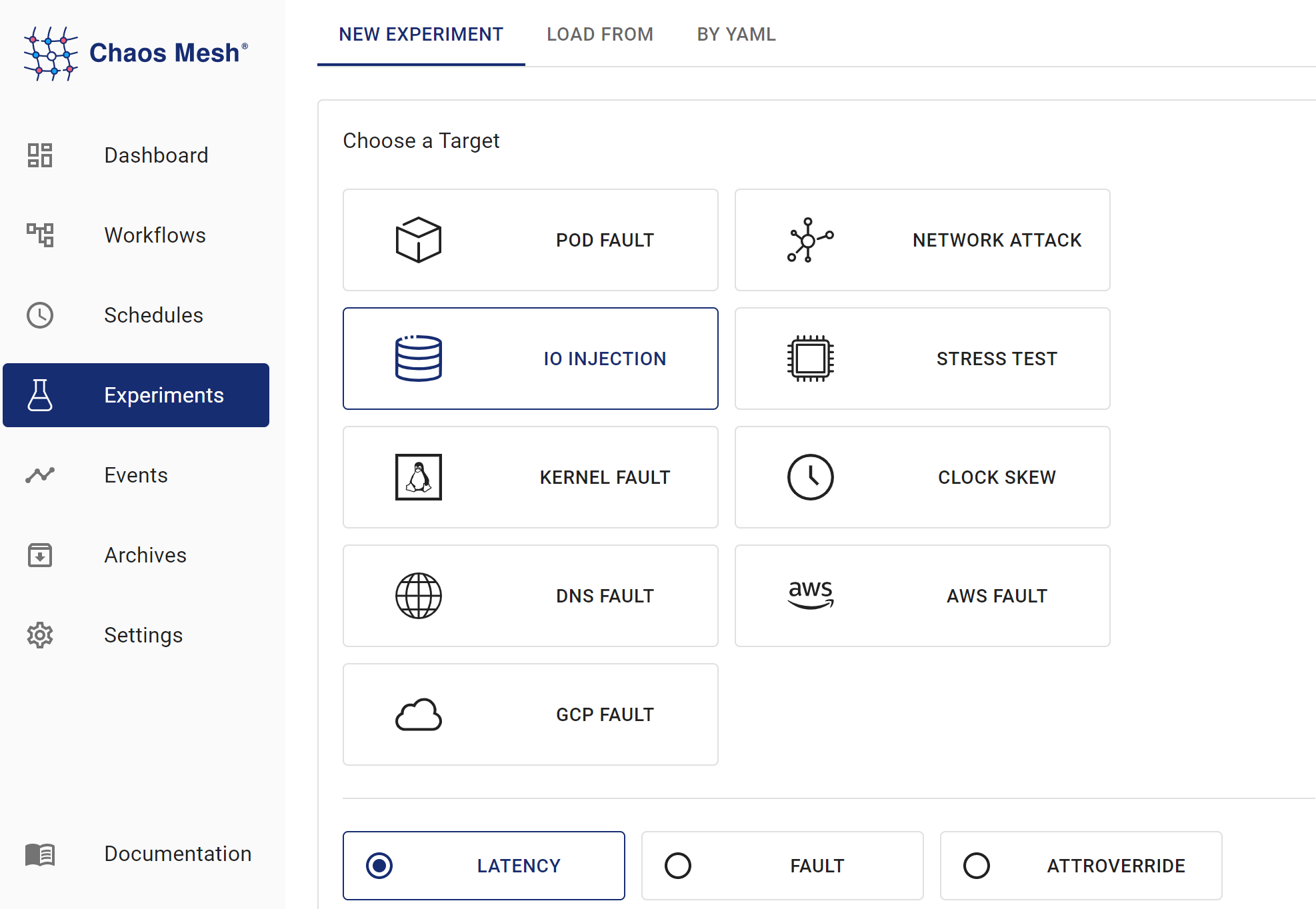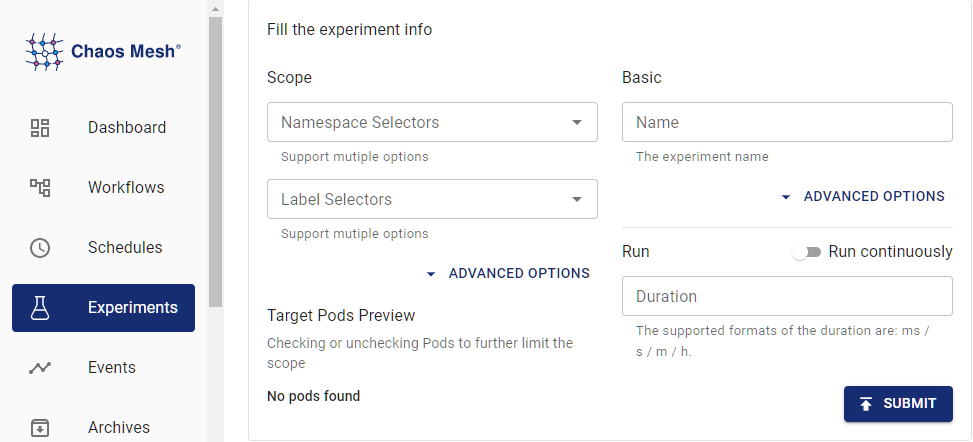Simulate File I/O Faults
This document describes how to create IOChaos experiments in Chaos Mesh.
IOChaos introduction
IOChaos is a type of fault in Chaos Mesh. By creating an IOChaos experiment, you can simulate a scenario of file system fault. Currently, IOChaos supports the following fault types:
latency: delays file system callsfault: returns an error for filesystem callsattrOverride: modifies file propertiesmistake: makes the file read or write a wrong value
For specific features, refer to Create experiments using the YAML files.
Notes
-
Before creating an IOChaos experiment, make sure there is no Control Manager of Chaos Mesh running on the target Pod.
-
IOChaos may damage your data. Use IOChaos with caution in the production environment.
Create experiments using Chaos Dashboard
-
Open Chaos Dashboard, and click NEW EXPERIMENT on the page to create a new experiment:

Create a New Experiment -
In the Choose a Target area, choose FILE SYSTEM INJECTION and select a specific fault type, such as LATENCY.

ioChaos Experiments -
Fill out the experiment information, and specify the experiment scope and the scheduled experiment duration.

Experiment Information -
Submit the experiment information.
Create experiments using the YAML files
Latency example
-
Write the experiment configuration to the
io-latency.yamlfile, as shown below:apiVersion: chaos-mesh.org/v1alpha1
kind: IOChaos
metadata:
name: io-latency-example
namespace: chaos-mesh
spec:
action: latency
mode: one
selector:
labelSelectors:
app: etcd
volumePath: /var/run/etcd
path: '/var/run/etcd/**/*'
delay: '100ms'
percent: 50
duration: '400s'In this configuration example, Chaos Mesh injects a delay into the directory
/var/run/etcdand causes latency of 100 milliseconds to all file system operations (including read, writing, list contents, and so on) in this directory. -
After the configuration file is prepared, use
kubectlto create an experiment:kubectl apply -f ./io-latency.yaml
Fault example
-
Write the experiment configuration to the
io-fault.yamlfile, as shown below:apiVersion: chaos-mesh.org/v1alpha1
kind: IOChaos
metadata:
name: io-fault-example
namespace: chaos-mesh
spec:
action: fault
mode: one
selector:
labelSelectors:
app: etcd
volumePath: /var/run/etcd
path: /var/run/etcd/**/*
errno: 5
percent: 50
duration: '400s'In this example, Chaos Mesh injects a file fault into the directory
/var/run/etcd, which gives a 50% probability of failure in all file system operations under this directory and returns error code 5 (Input/output error). -
After the configuration file is prepared, use
kubectlto create an experiment:kubectl apply -f ./io-fault.yaml
attrOverride example
-
Write the experiment configuration to the
io-attr.yamlfile:apiVersion: chaos-mesh.org/v1alpha1
kind: IOChaos
metadata:
name: io-attr-example
namespace: chaos-mesh
spec:
action: attrOverride
mode: one
selector:
labelSelectors:
app: etcd
volumePath: /var/run/etcd
path: /var/run/etcd/**/*
attr:
perm: 72
percent: 10
duration: '400s'In this configuration example, Chaos Mesh injects
/var/run/etcddirectoriesattrOverridefault, giving a 10% probability that all file system operations in this directory will change the target file permissions to 72 (110 in octal), which will allow files to be executed only by the owner and their group and not authorized to perform other actions. -
After the configuration file is prepared, use
kubectlto create an experiment:kubectl apply -f ./io-attr.yaml
Mistake example
-
Write the experiment configuration to the
io-mistake.yamlfile:apiVersion: chaos-mesh.org/v1alpha1
kind: IOChaos
metadata:
name: io-mistake-example
namespace: chaos-mesh
spec:
action: mistake
mode: one
selector:
labelSelectors:
app: etcd
volumePath: /var/run/etcd
path: /var/run/etcd/**/*
mistake:
filling: zero
maxOccurrences: 1
maxLength: 10
methods:
- READ
- WRITE
percent: 10
duration: '400s'In this configuration example, Chaos Mesh injects read and write faults into the directory
/var/run/etcd, which gives a 10% probability of failure in the read and write operations under this directory. During this process, one random position with a maximum length of 10 bytes will be replaced with 0 bytes. -
After the configuration file is prepared, use
kubectlto create an experiment:kubectl apply -f ./io-mistake.yaml
Field description
General fields
| Parameter | Type | Description | Default value | Required | Example |
|---|---|---|---|---|---|
| action | string | Indicates the specific type of faults. Only latency, fault, attrOverride, and mistake are supported. | Yes | latency | |
| mode | string | Specifies the mode of the experiment. The mode options include one (selecting a Pod at random), all (selecting all eligible Pods), fixed (selecting a specified number of eligible Pods), fixed-percent (selecting a specified percentage of the eligible Pods), and random-max-percent (selecting the maximum percentage of the eligible Pods). | None | Yes | one |
| selector | struct | Specifies the target Pod. For details, refer to Define the experiment scope. | None | Yes | |
| value | string | Provides parameters for the mode configuration, depending on mode. For example, when mode is set to fixed-percent, value specifies the percentage of Pods. | No | 1 | |
| volumePath | string | The mount point of volume in the target container. Must be the root directory of the mount. | Yes | /var/run/etcd | |
| path | string | The valid range of fault injections, either a wildcard or a single file. | Valid for all files by default | No | /var/run/etcd/*/ |
| methods | []string | Type of the file system call that requires injecting fault. For more information about supported types, refer to [Appendix A](#appendix-a: methods-type). | All Types | No | READ |
| percent | int | Probability of failure per operation, in %. | 100 | No | 100 |
| containerNames | []string | Specifies the name of the container into which the fault is injected. | No | ||
| duration | string | Specifies the duration of the experiment. | Yes | 30s |
Fields related to action
The following are specific information about fields corresponding to action:
-
latency
Parameter Type Description Default value Required Example delay string Specific delay time Yes 100 ms -
fault
Parameter Type Description Default value Required Example errno int returned error number Yes 22 For common error numbers, see Appendix B.
-
attrOverride
Parameter Type Description Default value Required Example attr AttrOverrideSpec Specific property override rules Yes As follows AttrOverrideSpec is defined as follows:
Parameter Type Description Default value Required Example ino int ino number No size int File size No blocks int Number of blocks that the file uses No atime TimeSpec Last access time No mtime TimeSpec Last modified time No ctime TimeSpec Last status change time No kind string File type, see fuser::FileType No perm int File permissions in decimal No 72 (110 in octal) nlink int Number of hard links No uidint User ID of the owner No gid int Group ID of the owner No rdev int Device ID No TimeSpec is defined as follows:
Parameter Type Description Default value Required Example sec int timestamp in seconds No nsec int Timestamp in nanoseconds No For the specific meaning of parameters, you can refer to man stat.
-
mistake
Parameter Type Description Default value Required Example mistake MistakeSpec Specific error rules Yes MistakeSpec is defined as follows:
Parameter Type Description Default value Required Example filling string The wrong data to be filled. Only zero (fill 0) or random (fill random bytes) are supported. Yes maxOccurrences int Maximum number of errors in each operation. Yes 1 maxLength int Maximum length of each error (in bytes). Yes 1
::warning It is suggested that you only use mistake on READ and WRITE file system calls. Using mistake on other file system calls may lead to unexpected consequences, including but not limited to file system damage and program crashes. :::
Local debugging
If you are not sure about the effect of a certain Chaos, you can use toda to test the feature locally. Chaos Mesh also uses toda to implement IOChaos.
Appendix A: methods type
- lookup
- forget
- getattr
- setattr
- readlink
- mknod
- mkdir
- unlink
- rmdir
- symlink
- rename
- link
- open
- read
- write
- flush
- release
- fsync
- opendir
- readdir
- releasedir
- fsyncdir
- statfs
- setxattr
- getxattr
- listxattr
- removexatr
- access
- create
- getlk
- setlk
- bmap
For more information, refer to fuser::Filesystem.
Appendix B: Common Error Numbers
- 1: Operation not permitted
- 2: No such file or directory
- 5: I/O error
- 6: No such device or address
- 12: Out of memory
- 16: Device or resource busy
- 17: File exists
- 20: Not a directory
- 22: Invalid argument
- 24: Too many open files
- 28: No space left on device
For more information, refer to Linux source code.